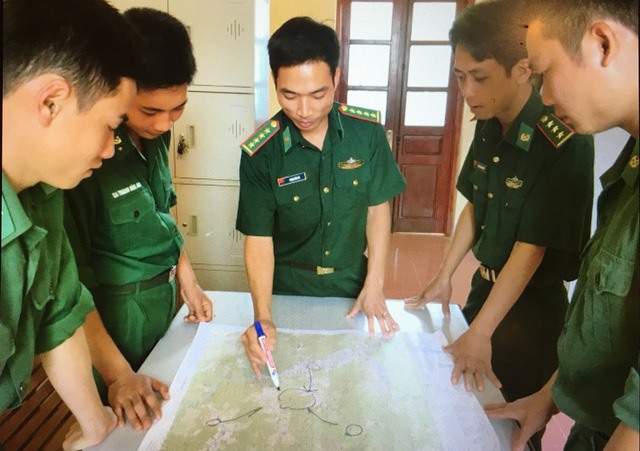 Society
Society

Phạm Văn Tài, a 31 year-old border soldier heads the Lóng Sập Border Gate’s anti-drug trafficking team.
 |
| Tài (centre) works with his team members at the border gate station. — Photo tuoitre.vn |
SƠN LA — Phạm Văn Tài, a 31 year-old border soldier heads the Lóng Sập Border Gate’s anti-drug trafficking team. He recalled the morning in June 2015 when he and his colleagues arrested four drug traffickers during a dawn raid in Mộc Châu District of northern mountainous Sơn La Province.
That morning, Tài and his team worked from 5am to 9am on the road leading to the border between Việt Nam and Laos. At 9am, they encountered two suspected drug traffickers driving motorbikes down the road.
Tài told them to stop for an inspection. Suddenly, a couple driving a second motorbike tried to crash into the team but failed. Tài and three colleagues chased after the couple for 2km along a dangerous, sloping road. When the chase came to an end, the solider discovered the couple, part of the same smuggling ring as the occupants of the first motorbike the team stopped, was carrying 20 cakes of heroin, worth about VNĐ4 billion (US$176,000).
Tài said he did not remember exactly how many dangerous criminal chases he and his team have conducted over the seven years that he has worked there. Mộc Châu District is believed to be the country’s top drug hotspot in recent years, the Tuổi trẻ (Youth) newspaper reported.
Major Đào Mạnh Tưởng, working at the border gate station, said the Laos territory on the other side of the border was an area troubled by drug and weapon trafficking rings.
The length of the border between the two countries in the province is over 40km. The roads wind erratically through the forest like a maze, creating an advantage for criminals looking to illegally transport drugs into Việt Nam, Tưởng said.
Dangers await, tiring job
Tài said that once he and his men approached three men suspected of trafficking. One of them wore a backpack that the team believed contained heroin. When the suspects saw the team, they immediately drew their guns and pointed them at the officers.
It was a dangerous situation but the soldiers maintained control thanks to their professional training.
“We all know that working this job, dangers always wait ahead and we always prepare for this,” he added.
Another time, Tài led his team to escort a suspected man to the station. As they passed through the village where the suspect lived, the suspect loudly screamed for help from the villagers. Then, a crowd of villagers, who belong to a local ethnic minority, demanded the team free the suspect unconditionally.
The messy situation only ended when the team asked for help from the village’s head to clearly explain to the villagers that they should allow the team to lead the suspect to the station, he said.
"It is a sudden situation that we were not taught to deal with in our school," he said.
Not only danger but also fatigue challenges Tài and his colleagues.
Tài said most local roads are dangerous. During the rainy and storm season, motorbikes are the only vehicles allowed to drive on the road. During torrential rains, mud blocks the roads and the soldiers must often travel by foot for several kilometres to go patrol.
The winter is very cold, sometimes negative 4 or 5 degrees Celsius, and occasionally it snows. “Working outdoor on these days, we really felt the harshness of the winter here,” he said.
Tài also said his wife always worried for him and many times she tried to persuade him to find another job.
“But I’ve selected this job at first, I’ve been attached to it for many years and I know the meaning of this job more than anyone,” he said. “And I can’t find any reason to quit it so far.”
Statistics from the border gate station showed that in his seven years working there, Tài has arrested 59 suspects and seized 29 cakes of heroin, over 31,000 ecstasy pills, two guns and 63 bullets. He also participated in efforts to destroy three drug-trafficking rings in the district.
Tài was selected as one of ten outstanding members of the border gate soldier force of Việt Nam in 2016. — VNS




